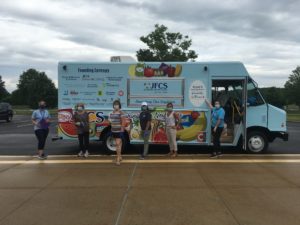July 27, 2020
In June 2019, Michelle Napell, Executive Director of Jewish Family & Children’s Service of Greater Mercer County (JFCS) announced the idea for a new venture – a mobile food pantry which would deliver nutritious food directly to those in Mercer County vulnerable to food insecurity and hunger. Six months later, the JFCS Mobile Food Pantry was on the road.
Since January 2020, the JFCS Mobile Food Pantry has benefitted more than 6,000 individuals across 40 distribution stops.
“We launched in January and made three stops, which served about 350 individuals, by the end of February,” said Michelle Napell. “Then March came, and with it the COVID-19 pandemic that changed the dynamic of our community. The mobile pantry became an incredibly valuable resource as demand for food increased as well as the obstacles in getting food to those with the greatest need.”
The pandemic increased demand for food in Mercer County, especially for the elderly and other vulnerable populations. JFCS ramped up the mobile pantry distribution schedule and forged a number of new partnerships.
“At the start of the shutdown, we connected with our existing partners and made sure that the local health departments, school districts, and community agencies knew about our resources,” said Beth Englezos, Manager of Hunger Prevention. “It is incredible to see how word continues to spread through the network of community and service agencies in Mercer County. We receive new calls each week from potential distribution sites.”
The network of partners has reached 8 of the 12 municipalities across Mercer including East Windsor, Hightstown, Lawrenceville, Princeton, Robbinsville, Trenton, West Windsor, and Yardville (Hamilton). Distribution locations include churches, low-income housing, low-income senior housing, day care centers, housing for adults with disabilities, and several local schools to support their students receiving Title I benefits. The Mobile Food Pantry is making three distributions stops per week.
The JFCS Mobile Food Pantry was designed to take the healthy-choice pantry experience on the road to partner locations where there would be a captive audience in need of this support. Due to COVID-19 health and safety guidelines, the mobile pantry and brick-and-mortar pantry, located at JFCS’ Alexander Road offices, now provide pre-packed bags of food.

Staff from the Paul Robeson Charter School for the Humanities (Trenton, NJ), who organize the “Panther Pantry” to support students and their families, help JFCS staff unload a delivery of pre-packed bags of groceries to be distributed to their students.
“While we had to eliminate the choice option for the safety of staff, partners and those we serve, JFCS remained committed to offering healthy food options,” said Englezos. “We broadened our supplier network and recently we’ve been fortunate to have corporate supporters provide large-scale donations of Kosher food, including nutritious fresh and frozen products.”
For six weeks from July through August, Novo Nordisk, in partnership with their corporate food supplier, Sodexo, facilitated weekly deliveries of fresh, frozen and shelf-stable food products to JFCS for use on the mobile and on-site pantries.
“The Novo Nordisk and Sodexo connection is just one example how our existing funding partners have demonstrated innovation and generosity during these difficult times,” said Napell. “We deeply appreciate this support, especially the adherence to our Kosher guidelines.”

Representatives from Project Freedom, a network of housing developments for adults with disabilities and financial need, in front of the JFCS Mobile Food Pantry on a distribution stop.

Staff and teachers from Town Center Elementary School (West Windsor Plainsboro School District) helped at the distribution stop, one of several sponsored by Firmenich.
The brick-and-mortar pantry, [Yvette Sarah Clayman Kosher Food Pantry] and mobile food pantry, are kept Kosher in line with the agency’s Jewish roots, however both are open to the broader community regardless of background or faith.
“At the roll out, we anticipated a gradual increase in weekly stops over our first few months. The pandemic tested our capabilities and I am proud to say the team rose to the challenge,” says Napell. “We are preparing now to develop the processes and funding to get our mobile pantry on the road five days a week.”
